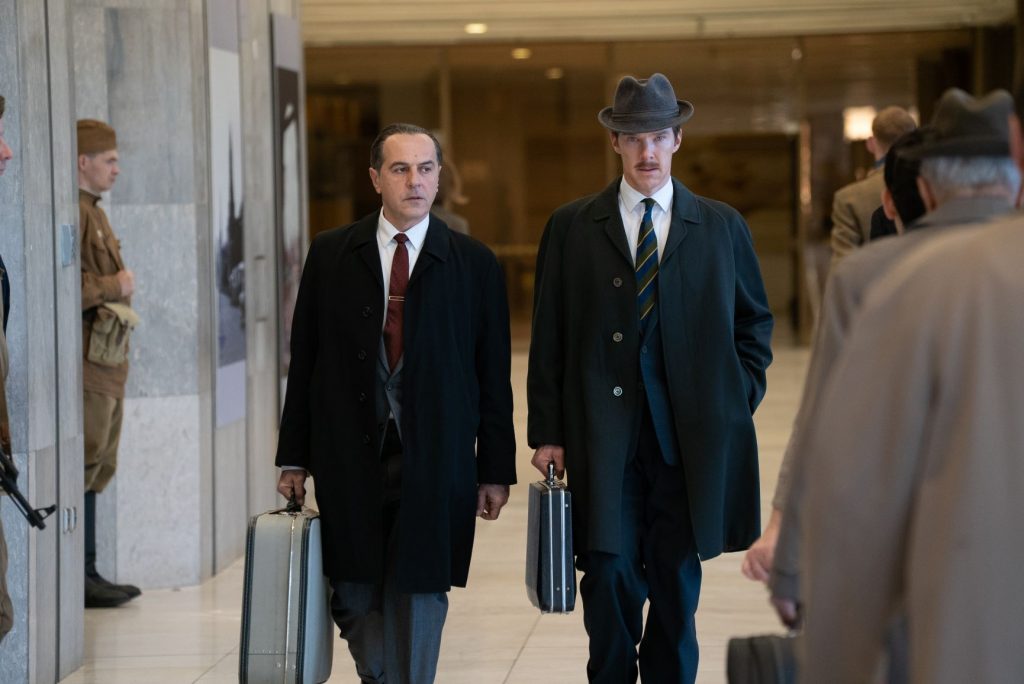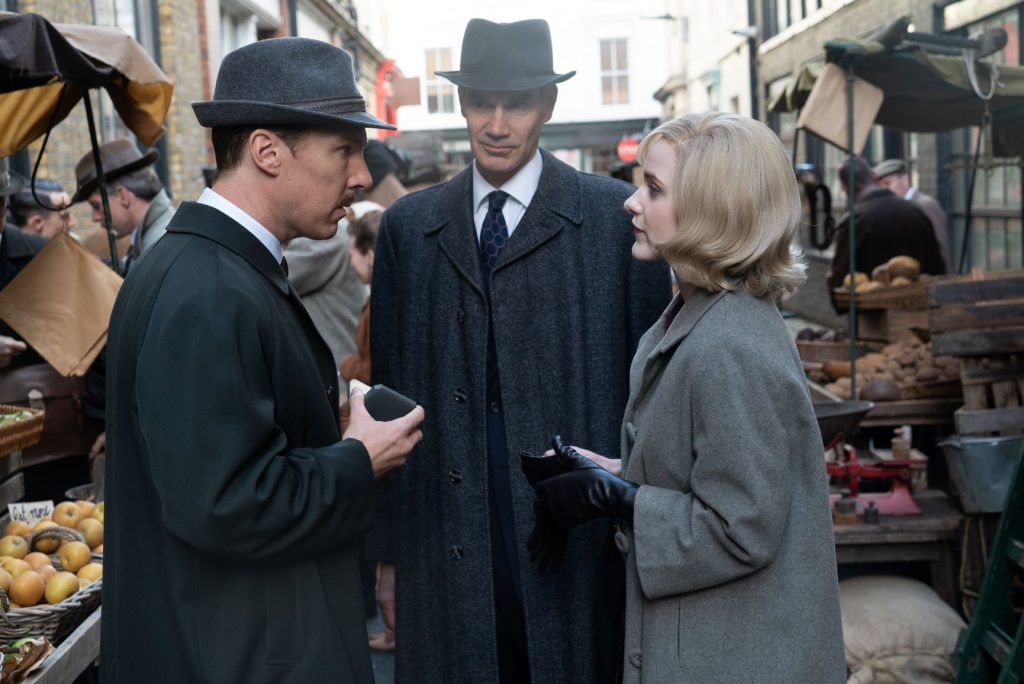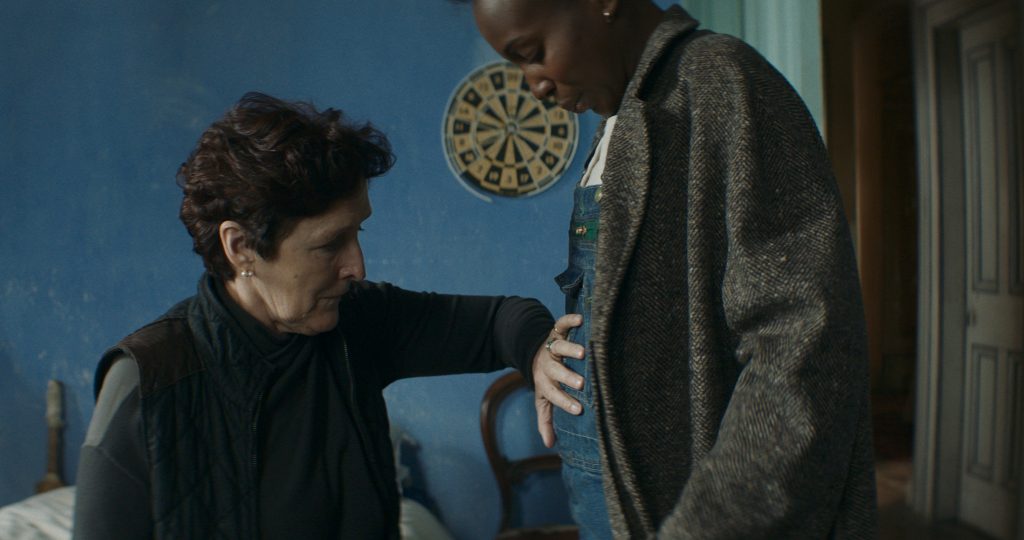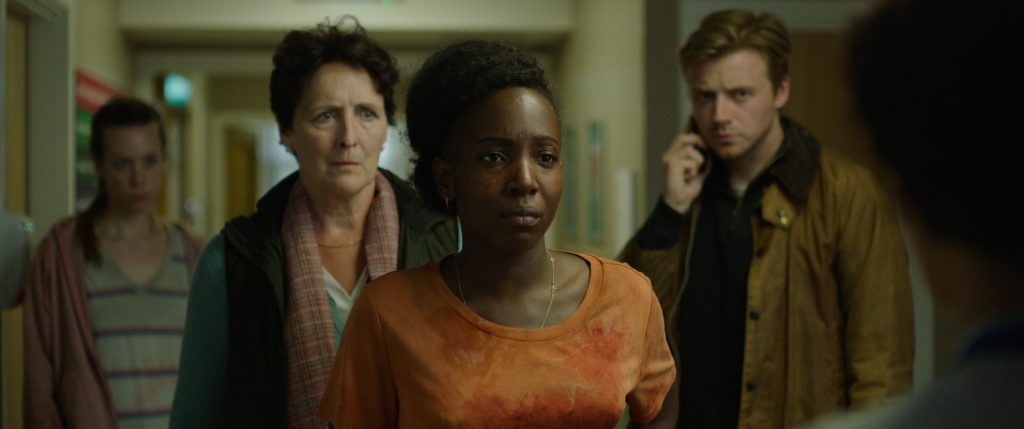March 26, 2021
by Carla Hay

Directed by Dominic Cooke
Some language in Russian with subtitles
Culture Representation: Taking place in the 1960s in Moscow, London and briefly in Langley, Virginia, the spy drama “The Courier” features an all-white cast of characters representing the middle-class, primarily those who work for the government.
Culture Clash: A British businessman becomes a spy for MI6, as the Cold War between the Soviet Union and Western countries begins to escalate under the possibility of nuclear weapon attacks.
Culture Audience: “The Courier” will appeal primarily to people who like espionage movies that go beyond the political intrigue and examine the toll that spying can take on family life.

“The Courier,” which is inspired by true events, aims to put a spotlight on people who have been historically underrated in preventing a nuclear war between the then-Soviet Union and countries such as the United Kingdom and the United States. The main characters of this movie just happen to be spies. Elevated by above-average acting, “The Courier” is not an essential spy movie, but it’s good enough for people who enjoy this genre.
Politicians tend to get the most credit for de-escalating international tensions that could turn into war. However, “The Courier” (directed by Dominic Cooke and written by Tom O’Connor) makes a case that spies have also been instrumental in preventing wars. It’s pretty obvious why spies don’t get as much credit as politicians do: Because spies’ work is secretive and undercover, their identities as spies cannot be revealed, unless their cover is blown in some way.
That’s what happened to the two spies who are at the center of this story: Greville Wynne (played by Benedict Cumberbatch) from the United Kingdom and Oleg Penkovsky (played by Merab Ninidze) from the Soviet Union. Their paths collided in 1960, when Oleg, a longtime bureaucrat, became increasingly alarmed over then-Soviet Union premier Nikita Khrushchev’s nuclear threats against Western countries such as the United States and the United Kingdom. (The partnership between these two spies was also portrayed in the 1985 BBC miniseries “Wynne and Penkovsky,” which A&E televised in the U.S. under the name “The Man From Moscow.”)
“The Courier” opens with a scene in Moscow on August 12, 1960, showing Premier Khrushchev giving an inflammatory speech in a closed-door meeting with other Russian bureaucrats. What’s said in that meeting is enough for Oleg to do what he had probably been contemplating for quite some time: He becomes a whistleblower who warns the United States about these imminent nuclear weapons threats. Oleg meets with two unidentified American men at night, gives them some paperwork, and urges them to take this paperwork to the U.S. embassy in Moscow.
Four months later at MI6 headquarters in London, a briskly confident and young CIA operative named Emily Donovan has a meeting with two MI6 operatives: Arthur Temple “Dickie” Franks (played by Angus Wright) and Bertrand (played by Anton Lesser), whose last name is not mentioned in the movie. (In real life, Franks would later become the head of MI6 from 1979 to 1982.) Emily walks into the meeting and tells these older men, “I’ve brought you boys a present.”
The “present” is information that’s a dream come true for any intelligence agency that wants to spy on the Soviet Union: A Soviet spy has offered to become a double agent for the CIA because of his concerns over Khrushchev’s erratic personality and increasing possibilities that Khrushchev will start a nuclear war against the nations that are the Soviet Union’s enemies. This Soviet spy is Oleg, who wants to smuggle out information by a courier.
The CIA can’t send an American courier to be Oleg’s contact in the Soviet Union, because it would be too obvious. And so, the CIA has sent Emily to enlist the help of MI6 to send a Brit to Moscow to become Oleg’s courier. In the meeting with the MI6 officials, Emily says that the selected courier should be someone whom the Russians would least expect: a person with no history of working for a government agency.
Greville’s name comes up in the meeting because he’s a businessman who frequently travels outside of the United Kingdom. In real life, he had already visited Moscow several times by the time he became a spy. In the movie, Greville is portrayed as someone who is so unfamiliar with Moscow, that Oleg is the first person to introduce Greville to the city. And in the movie, Greville doesn’t know any Russian when he first arrives in Moscow, so Oleg is often his translator.
In the meeting between the CIA and MI6 operatives, Emily gives Dickie and Bertrand a brief background on Oleg so that they know that he’s a government insider who can be trusted. Oleg is a former military colonel and artillery officer who was decorated 13 times during World War II. He lives in Moscow and works for the GRU, the Soviet Union/Russia’s military intelligence agency. But since Oleg is a spy, his cover is overseeing the state committee on scientific research.
“The Courier” was originally titled “Ironbark,” which is Oleg’s code name as a spy. The title change was no doubt to shift the focus more on the Greville Wynne character, who gets more screen time and who is portrayed by a better-known actor. The movie is a story about two very different spies who become unlikely partners with a common goal: to protect their respective countries from engaging in a nuclear war. However, “The Courier” shows more of Greville’s personality and home life than it does for Oleg.
Oleg lives a quiet and unassuming life with his wife Vera (played by Maria Mironova) and their daughter Nina (played by Emma Penzina), who’s about 5 or 6 years old. By all appearances Oleg and Vera have a happy marriage and are loving parents to Nina. Oleg and Vera are both even-tempered and have mutual respect for each other. Later in the story, it’s revealed that Vera knows that Oleg is a spy.
Greville has a very different personality and marriage. A hard-drinking businessman, Greville is sometimes quick to lose his temper. And his marriage to his wife Sheila (played by Jessie Buckley) has become troubled due to Greville past infidelity. At the beginning of the story, Sheila and Greville have become distant from each other. It’s mentioned several times throughout the movie that Greville’s infidelity has broken Sheila’s trust in Greville, but she’s slowly trying to trust him again.
Sheila and Greville have a 10-year-old son named Andrew (played by Keir Hills), who sometimes becomes the target of Greville’s verbal tirades if Andrew does something harmless to set off Greville’s temper. For example, a scene in the movie shows Sheila, Greville and Andrew spending some family time together on a camping trip. Because the weather forecast predicted possible rain, Andrew was put in charge of bringing the family’s raincoats on the trip, but Andrew forgot to bring these items. When Greville finds out, he berates Andrew until Sheila tells him to stop, and she comforts Andrew by saying that Greville didn’t really mean his insulting remarks.
These glimpses into Greville’s home life show that he wasn’t the type of ideal hero that he could have been portrayed as in this movie. Rather, he was a very flawed human being who found himself caught up in a situation that ended up spiraling out of his control. When Greville is first approached by MI6 and the CIA to become a spy, these intelligence agencies already know that he’s a heavy drinker, but they want to take a chance on him because he can have a very charming personality and because he adapts quickly to foreign environments.
In the movie, it’s portrayed that MI6’s plan to lure Greville into becoming a spy starts with a phone call from Dickie, using the alias James Dobby and pretending to be an official from the U.K.’s board of trade. Greville had met “James” the previous year at some type of business conference. In the phone call, Dickie/James asks to meet with Greville for lunch to discuss a possible business opportunity.
When Greville arrives for the lunch, he’s surprised to see someone else is with Dickie: a young American woman, who introduces herself as Helena Talbot. Of course, that’s not her real name. Helena Talbot is really CIA operative Emily Donovan.
During this lunch conversation, “James” and “Helena” ask Greville how he would feel about doing business in the Soviet Union and what he would do to ingratiate himself with the government officials in Moscow. It doesn’t take long for Greville to figure out that “James” and “Helena” are really spies, but they won’t tell Greville their real names when he asks. And he wants no part of what they seem to be proposing.
Dickie tries to persuade Greville by saying that Greville’s spy work would be “nothing dodgy, nothing illegal. It would be a real service to Great Britain.” Emily adds, “And to the world.” Greville is told repeatedly that all he has to do is conduct business in Moscow as a salesman and bring back some paperwork that will be given to him by a contact person.
Greville still isn’t convinced because he thinks his life might be in danger if he becomes a spy. Dickie/”James” tells Greville that Greville being a middle-aged, non-athletic man who has a drinking problem doesn’t make him a spy stereotype of a dashing, physically fit hero with combat skills. Dickie adds, “My point is if this mission were the least bit dangerous, you really are the last man we’d send.” Greville replies with a sarcastic tone, “Thank you for putting it so delicately.”
Of course, Greville ultimately agrees to the mission. It’s implied that he said yes out of a sense of patriotism but also out of a sense of curiosity and probably to boost his ego. In that fateful first meeting, Dickie mentioned that he knows Greville spent time in the military doing office work only and not being in combat. Agreeing to this spy mission was probably Greville’s way of proving to himself that he really could be useful to the U.K. government.
“The Courier” tends to drag a little when it shows the actual back-and-forth of Oleg and Greville doing their spy transactions. After all, there’s not much excitement to be had when all Greville has to do is bring some paperwork back with him to the United Kingdom and hand off the documents to MI6. Oleg and Greville grow to like and respect each other, and they eventually meet each other’s wives and kids.
The real tension in the movie begins when Oleg and Greville are in danger of being exposed and punished by the Russian government. People who already know what happened in real life won’t be surprised by how it’s portrayed in the movie. (This part of the movie won’t be described in this review, since it’s considered spoiler information.) But it’s enough to say that the greatest strength of “The Courier” is in how it skillfully portrays the often-complex layers of loyalties that spies often have and how they have to choose between betraying a government or betraying an individual.
Greville keeps his spying activities a secret from Sheila for as long as possible. He tells her that his frequent trips to Moscow are because he wants to “open a door to the West” for Russians to do more business with Western companies such as his. Greville is described as working in sales, but the movie never really makes clear what he’s selling. (In real life, he was electrical engineer who became a business salesperson.)
At first, Greville’s trips to Moscow seem to boost his confidence. When he gets home, he’s much more amorous with Sheila, who is pleasantly surprised that their sex life has markedly improved. But as time wears on, the stress of his spy work starts to get to him, and he becomes more short-tempered. And because he is so vague with Sheila about what he does while he’s in Moscow, it isn’t long before Sheila starts to suspect that Greville is cheating on her.
“The Courier” also covers how the 1962 Bay of Pigs crisis in Cuba had a drastic effect on this spy mission. This political development ramps up the urgency, as well as the life-threatening risks, in what Oleg and Greville are doing. The last third of “The Courier” is the best part of the movie, as Cumberbatch in particular shows a range of emotions under extreme circumstances that make “The Courier” a compelling story to watch.
Under the solid direction of Cooke, “The Courier” isn’t a groundbreaking movie and follows a lot of conventions that are often seen in spy films. For example, there are the inevitable scenes of a spy making copies of important files and furtively looking around out of fear of being caught. The movie might be considered a bit dull in some areas for anyone who won’t have the patience to see the whole film.
What’s not conventional about “The Courier” and is actually quite refreshing is that it doesn’t have the tired cliché of the primary female spy character using her sexuality to get what she wants. The character of Emily is both intelligent and charismatic, but she’s not perfect, as she makes a critical error in judgment during one part of the story. There are some veiled references to the sexism that Emily no doubt experienced as a woman in the male-dominated CIA. But since she’s not the center of the story, the movie doesn’t expound on any gender discrimination within these types of government agencies in the U.S., the U.K. or in the former Soviet Union.
Through the Emily character, “The Courier” shows that even though the U.S.’s CIA and the U.K.’s MI6 teamed up for this mission, there was still some rivalry between these two allied countries. In a meeting at CIA headquarters in Langley, Virginia, she is seen giving a briefing to one of her supervisors. Emily tells him that she’s good at fooling the Brits by making the Brits think they’re in charge, because she often plays the part of someone who’s a naïve agent who’s eager to learn from her more experienced counterparts. The point of this scene is to demonstrate that Emily’s loyalty will be to the U.S., first and foremost.
All of the cast members play their roles well, but since Greville’s perspective is the one that gets the most importance, Cumberbatch’s performance is at the heart of the film, and he admirably rises to the challenge. The movie could have used more insight into Oleg’s character to show how being a double agent affected his state of mind. For example, the scene with the Wynne family on a camping trip wasn’t essential and could have been substituted with a more relevant scene showing Oleg’s personal trials and tribulations. As it stands, “The Courier” has a few areas that needed improving, but the overall end result is a worthwhile option if people are in the mood to watch a retro spy movie.
Lionsgate and Roadside Attractions released “The Courier” in U.S. cinemas on March 19, 2021. The movie’s VOD release date is April 16, 2021. “The Courier” will be released on Blu-ray and DVD on June 1, 2021.


